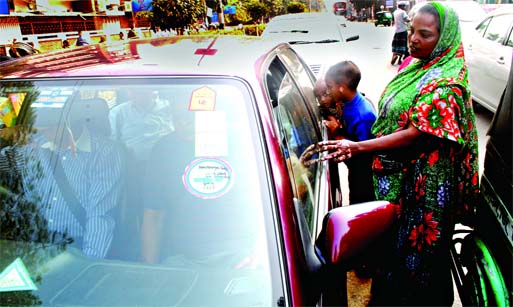
Sagar Biswas :
Begging is still rampant in different city areas, especially in diplomatic zone of Baridhara and posh Gulshan Residential Area, where some beggars are running the lucrative business engaging their entire family.
Although the authorities have recently declared three beggar-free zones in the capital city under the project named alternative employment and rehabilitation of people involved in begging, the ultimate impact of the declaration is apparently zero.
The multimillion-taka project was launched by the Social Welfare Ministry in the fiscal year 2010-11 to bring the country’s beggars under an umbrella by providing them shelter and job, but its progress is very slow till the date due to unbridled corruption of the concerned officials, sources alleged.
There is a widespread allegation that the relevant officials of Department of Social Service [DSS] have already spent the lion portion of the project money in different side schemes, especially in the name of survey and research, in spite of rehabilitating the beggars.
In 2010, the Social Welfare Ministry formulated a guideline for the survey to be conducted by some ten NGOs under the guidance of Bangladesh Bureau of Statistics and in cooperation with the National Foundation for Development of the Disabled Persons.
It was also decided that the beggars’ photographs would be taken to avoid duplicity and ensure their proper rehabilitation in different parts of the country.
The Ministry of Finance had also allocated Tk 12.47 crore for the project. But the plan was not materialized.
Currently, two pilot projects are going on — one in Mymensingh and another in Jamalpur — under the said mega project to survey the people engaged in begging. But nobody knows when the survey will be completed and when around 2,000 beggars of the areas will be rehabilitated.
There is also no exact information as when the entire country would be brought under the survey programme though four years have already elapsed in the meantime.
Director General of DSS Saidur Rahman, however, refrained from making any comment over the issue despite repeated queries last night.
Meanwhile, the DSS has hanged some signboards in the city declaring the Gulshan-Baridhara-Banani diplomatic zone, Pan Pacific Sonargaon Hotel to Bailey Road through Ruposhi Bangla Hotel intersection and Hazrat Shahjalal International Airport to Radisson Hotel as beggar-free areas.
But if anyone goes through the roads of Baridhara by private car, public transport or rickshaw or even on foot, he would have to encounter beggars. The beggars are seen frequently collecting alms from the people, even from the foreigners, despite the announcement.
The scenario is all the same in front of Hotel Ruposhi Bangla and Hotel Sonargaon. The beggars are also seen frequently seeking alms at bus stands, railway stations, markets, road intersections and at traffic signals in different city areas, including Farm Gate, Secretariat, Motijheel, Gulistan, Shahbagh and where not!
Their techniques are different. Some sing songs, some tell stories, some recite poems and some play tune. But, most embarrassing is that beggars often taunt and misbehave with people if they are not given money.
Sometimes the beggars come in groups. Sometimes women are seen carrying babies on their laps while some others are seen walking with the help of small boys. Some hire babies in exchange for Tk 60 to 100 per day to run the business. They are all professional beggars seen seeking alms from the people.
Members of the same family are also engaged in the profession in different ways. They all earn money from begging, which in total becomes a good amount and more lucrative amount than any other profitable business, the sources said.
A senior official of DSS involved in a survey project requesting anonymity told The New Nation on Saturday that begging has become a popular profession for some hardcore criminals and they force poor and disabled people in begging under a syndicate.
“There is an inter-relation between poverty and begging among physically disabled people. We found that own family members force about 26 per cent of the handicapped people into the profession,” the DS official said.
Ministry officials said that there is no specific data on number of beggars in the capital and others major cities. However, different government and non-government agencies estimate that it would more than two million across the country.
The number of beggars in the capital alone may be over 7 00, 000, they said.

